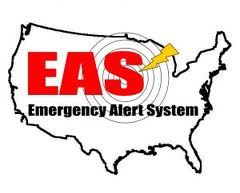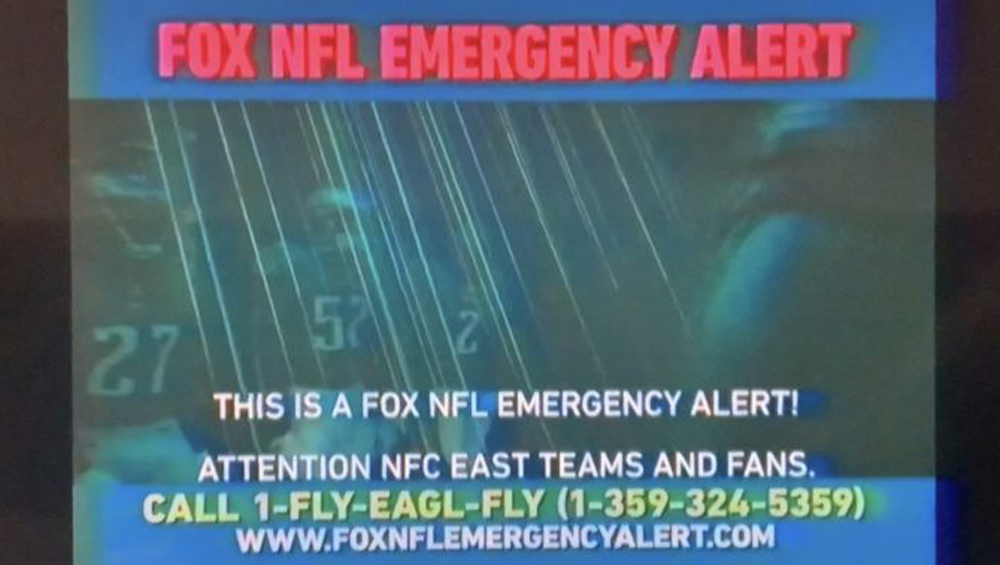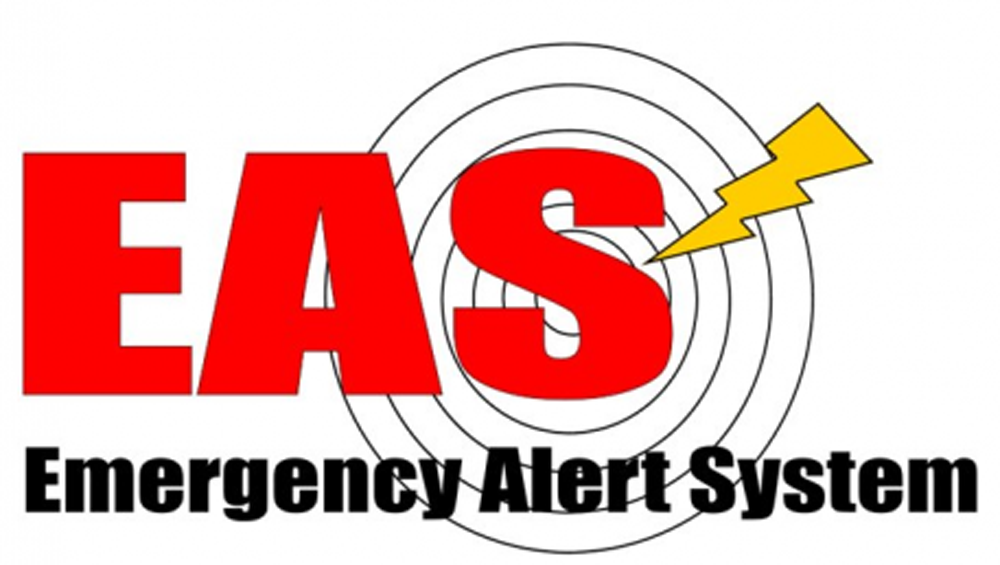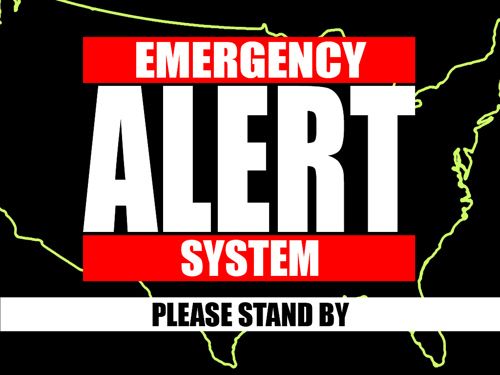Digital Alert Systems, a global provider of emergency communications solutions for media providers, and Masterplay, provider of the Masterplay On-Air playout system, today announced a new technology partnership. The Masterplay […]

This will be the third nationwide test for WEA alerts to cellphones, but the second test to all WEA-compatible cellular devices. The test message will display in either English or in Spanish, depending on the language settings of the wireless handset. This will be the seventh nationwide EAS test. It begins today at approximately 2:20 p.m. ET.
Digital Alert Systems, a global provider of emergency communications solutions for media providers, today announced that it has received a patent on its HALO system for managing Emergency Alert System […]

A rather unusual spot appearing to be a Fox NFL promo aired during yesterday’s NFL pre-game show. What made it particularly unusual was that it included an EAS-like tone, and had a URL at the bottom of the screen for “WWW.FOXNFLEMERGENCYALERT.COM.” That URL currently links to a “Let’s Go Brandon” website that I don’t encourage you to visit because our own spam software blocks access to it on the stated grounds of “Risky-Sites.”

The FCC Enforcement Bureau has issued a $20,000 fine against ESPN for “willfully violating the commission’s rules that prohibit the transmission of false or deceptive emergency alert system” tones during a program. The FCC said the violation occurred during the airing of 30 for 30: Roll Tide/War Eagle on Oct. 20, 2020.
Digital Alert Systems, which offers emergency communications solutions for media providers, announced guidance ahead of the next National Periodic Test (NPT) of the Emergency Alert System (EAS), scheduled for Aug. […]

Broadcasters are telling the FCC that over-the-top video providers can’t be relied on to relay emergency alerts, saying that, at least currently, the technological challenges make it “extremely burdensome, and likely infeasible, to update the EAS system to enable alerts to consumers provided through the internet, including through streaming devices.”

Aug. 11 will be the date of the first national EAS test since before the pandemic began. Officials at the Federal Emergency Management Agency officially informed the FCC on May 4, that it plans its sixth national EAS test on that day. They also plan to conduct a nationwide Wireless Emergency Alert (WEA) test concurrently.
Digital Alert Systems, a global provider of emergency communications solutions for media providers, today announced the availability of Version 4.3 of its Emergency Alert System (EAS) software running on the […]

At its March 17 monthly Open Meeting, the FCC will consider a Notice of Proposed Rulemaking seeking to modify certain aspects of the Emergency Alert System used by many of those regulated by the FCC including broadcasters, cable companies and wireless communications devices such as mobile phones. The FCC is reviewing these issues as required by the National Defense Authorization Act, passed by Congress at the end of 2020.
FEMA Cancels 2020 National EAS Test

The Federal Emergency Management Association says it will not conduct a national test of the Integrated Public Alert and Warning System (IPAWS) via the broadcast Emergency Alert System and Wireless Emergency Alert system this year.
Digital Alert Systems, a global provider in emergency communications solutions for media providers, has introduced a new price relief program for its family of Emergency Alert System (EAS) devices. To […]
Chicago-based Weigel Broadcasting Co., which owns and operates stations in nine markets in addition to MeTV and other digital multicast networks, is using Cobalt Digital’s software-defined 9922-FS-DSP platform for openGear frames […]
EAS Fine Against CBS Raises 1st Amend. Debate

False EAS alerts have typically popped up in commercials as a way of getting jaded viewers’ and listeners’ attention, which makes them challenging to successfully defend. But what happens when the use of the alert tone is not in an ad, like in the case of its inclusion by CBS in an episode of Young Sheldon? The FCC is effectively claiming that CBS falsely yelled “fire” in a crowded theater, which is the well-established exception to First Amendment protections. CBS, on the other hand, is countering that it only yelled “boogeyman,” and that any reasonable viewer isn’t going to panic, because the public knows the difference between real and fictional things.
FCC Reminds Stations Of Sept. 23 EAS Deadline
The FCC is reminding all broadcasters and other EAS participants of the obligation to file their ETRS Form Three report by Sept. 23. That form provides details about a station’s participation in the Aug. 7 Nationwide EAS Test, including from where the station received the EAS alert (assuming that it did receive the alert) and any complications or issues that may have arisen in connection with the test.

The commission says the fine for an episode of Young Sheldon reinforces its rule that Emergency Alert System tones must only be used for real emergencies and authorized testing.
EAS National Test Scheduled For Aug. 7

Unless it is delayed by a real national emergency, the Federal Emergency Management Agency and the FCC are on track to conduct a combined nationwide test of the Emergency Alert System on Wednesday, Aug. 7, at 2:20 p.m. ET. For most participants, this year’s test will be disseminated only using the broadcast “daisy chain,” rather than through the internet-based Integrated Public Alert and Warning System.
WASHINGTON, July 24, 2019—FEMA, in coordination with the FCC, will conduct a nationwide test of the Emergency Alert System (EAS) on Wed., Aug. 7, 2019. The nationwide test will be sent to radio […]
FCC Highlights State EAS Plans

The FCC earlier last week posted on its blog an article from the chief of its Public Safety and Homeland Security Bureau about state EAS plans, stressing how important these plans are to making sure that any emergency message conveyed through an EAS alert is properly transmitted to all who are supposed to receive it, so that it ultimately reaches the members of the public who should be aware of the emergency situation which triggered the alert. The article contains a link to all of the state EAS plans that have been submitted to and approved by the FCC. Is your station doing what it’s supposed to be doing?
Next National EAS Test Is Aug. 7, Has A Twist

The Federal Emergency Management Agency has scheduled the next nationwide test of the Emergency Alert System for Aug. 7 at 2:20 p.m. FEMA says this year’s test will differ from the nationwide tests that have been conducted over the past several years in that it will be issued through the National Public Warning System, composed of FEMA-designated Primary Entry Point facilities, to test the readiness of the EAS to function in the absence of internet connectivity.

Lisa M. Fowlkes, chief of the FCC’s Public Safety and Homeland Security Bureau, says broadcasters play a vital role during emergencies and the public relies on them to stay informed, find resources and stay safe. “To continue fulfilling this important mission, broadcasters must ensure that their systems are secure and reliable. Here are some best practices to help.”
False Alarm Could Land WBBM In Trouble
National EAS, WEA Test Postponed

The Federal Emergency Management Agency, in coordination with the FCC, announced Monday morning that the National Emergency Alert System and Wireless Emergency Alerts tests scheduled for this Thursday, Sept. 20, have been postponed due to “ongoing response efforts to Hurricane Florence.”
Broadcasters Need To Prep For EAS Test

The FCC and FEMA have established Sept. 20 as the date for the next nationwide test of the Emergency Alert System. The nationwide test is designed to study the effectiveness of the EAS and to monitor the performance of EAS participants. The Wireless Emergency Alert system will be tested immediately prior to the test of the EAS. While the test itself is a month away, all EAS participants must file their Form One with the FCC by Aug. 27 in preparation for the test.
EAS, WEA National Tests Scheduled For Sept. 20
ETRS Form One Due Aug. 27 For EAS Participants
Public interest group MMTC had petitioned the US Court of Appeals for a rehearing on its decision upholding the FCC decision deciding not to impose any multilingual EAS obligations on broadcasters. The full Court of Appeals has just issued a one sentence order denying that reconsideration request. While, theoretically, MMTC’s next appeal would be to the Supreme Court, lacking an issue of major significance or constitutional importance, that is unlikely.
Alert System Is Fragile, Fragmented, Outdated
 The false alert of a nuclear attack on Hawaii is an inexcusable, but hardly isolated example of the fragility and fragmentation of America’s emergency alerting system. As natural and manmade threats persist and increase, it is clear that our alerting system is not up to the task of serving the mobile and connected America of the 21st Century.
The false alert of a nuclear attack on Hawaii is an inexcusable, but hardly isolated example of the fragility and fragmentation of America’s emergency alerting system. As natural and manmade threats persist and increase, it is clear that our alerting system is not up to the task of serving the mobile and connected America of the 21st Century.
Saturday’s false missile alert in Hawaii is fueling doubts about the Emergency Alert System’s ability to keep Americans informed in an actual emergency.
Blue Alerts are designed to protect law enforcement officers and communities.
Court Rejects Appeal Of Multilingual EAS
The U.S. Court of Appeals yesterday issued an order that denied the appeal of an FCC order that rejected a requirement that multilingual EAS alerts be provided in every market.
 John Lawson, executive director of the AWARN Alliance, will inform attendees at next week’s TV2020: Monetizing the Future conference of the progress toward implementing an advanced emergency alerting system as part of the coming ATSC 3.0 broadcast standard.
John Lawson, executive director of the AWARN Alliance, will inform attendees at next week’s TV2020: Monetizing the Future conference of the progress toward implementing an advanced emergency alerting system as part of the coming ATSC 3.0 broadcast standard.
Today’s The Day: EAS Test, Form 2 Deadline
Earlier this week, the FCC and FEMA released a final reminder that this year’s nationwide test of the Emergency Alert System will occur today, Sept. 27, at 2:20 p.m. ET. The test will be transmitted in both English and Spanish and broadcasters will choose which one to air in their communities. Stations unaffected by Hurricanes Harvey, Irma and Maria must file a Form 2, the day-of-test reporting form, via the FCC’s Emergency Test Reporting System by 11:59 p.m. ET tonight.
Assuming that it is not delayed due to a real national emergency, the Federal Emergency Management Agency and the FCC are still scheduled to conduct a nationwide test of the Emergency Alert System on Sept. 27 at 2:20 p.m. ET.
Problems With FCC EAS Filing Deadline
The FCC and FEMA set Sept. 27 as the date for the next nationwide test of the Emergency Alert System. Like last year’s test, all EAS participants must file Form 1 a month before the test. The Form 1 has been modified, however, requiring information that was not requested previously. In addition, the FCC’s Emergency Test Reporting System has been revamped so that prior log in codes do not work and the system’s functionality is now unfamiliar to prior users. As a result, while the Form 1 is technically due next Monday, Aug. 28, anyone who has not yet started the filing process should begin immediately and aim to finish the process this week.
FEMA (the Federal Emergency Management Agency) has notified the FCC that it will be conducting the next nationwide test of the EAS system on Sept. 27 (with a back-up date of Oct. 4 — in the event potential real emergencies make the earlier date one that could cause confusion). The FCC has updated its reporting system for stations to provide information about the success of the test, and should be better able to track station’s participation in the test. Thus, to make sure that you can report a successful test, this is a good time for stations to insure that they are monitoring the correct EAS sources as required by their state EAS plan, that they have their online EAS CAPS alert systems functional, and that they are properly receiving, conducting and logging their weekly and monthly tests.










































